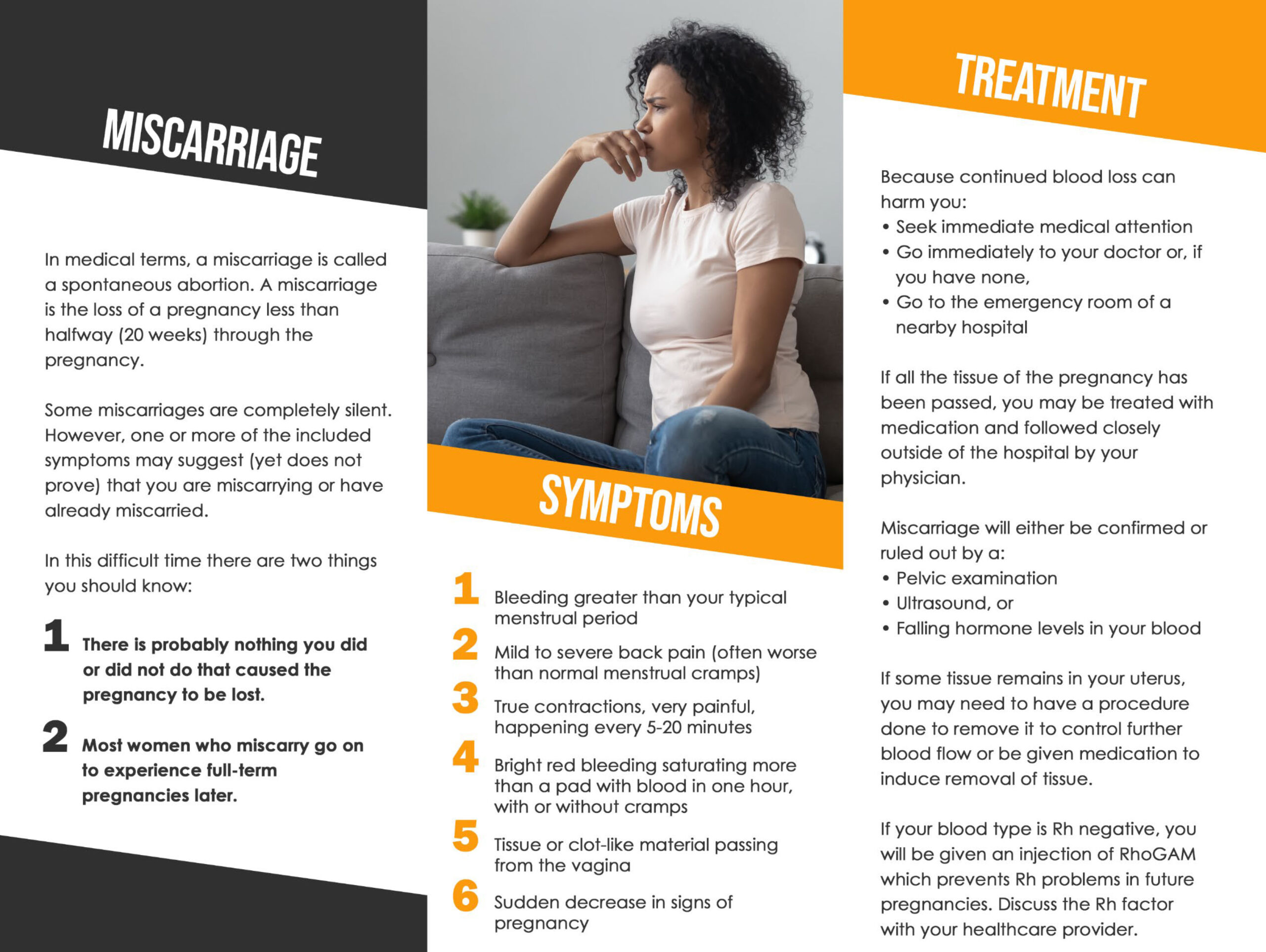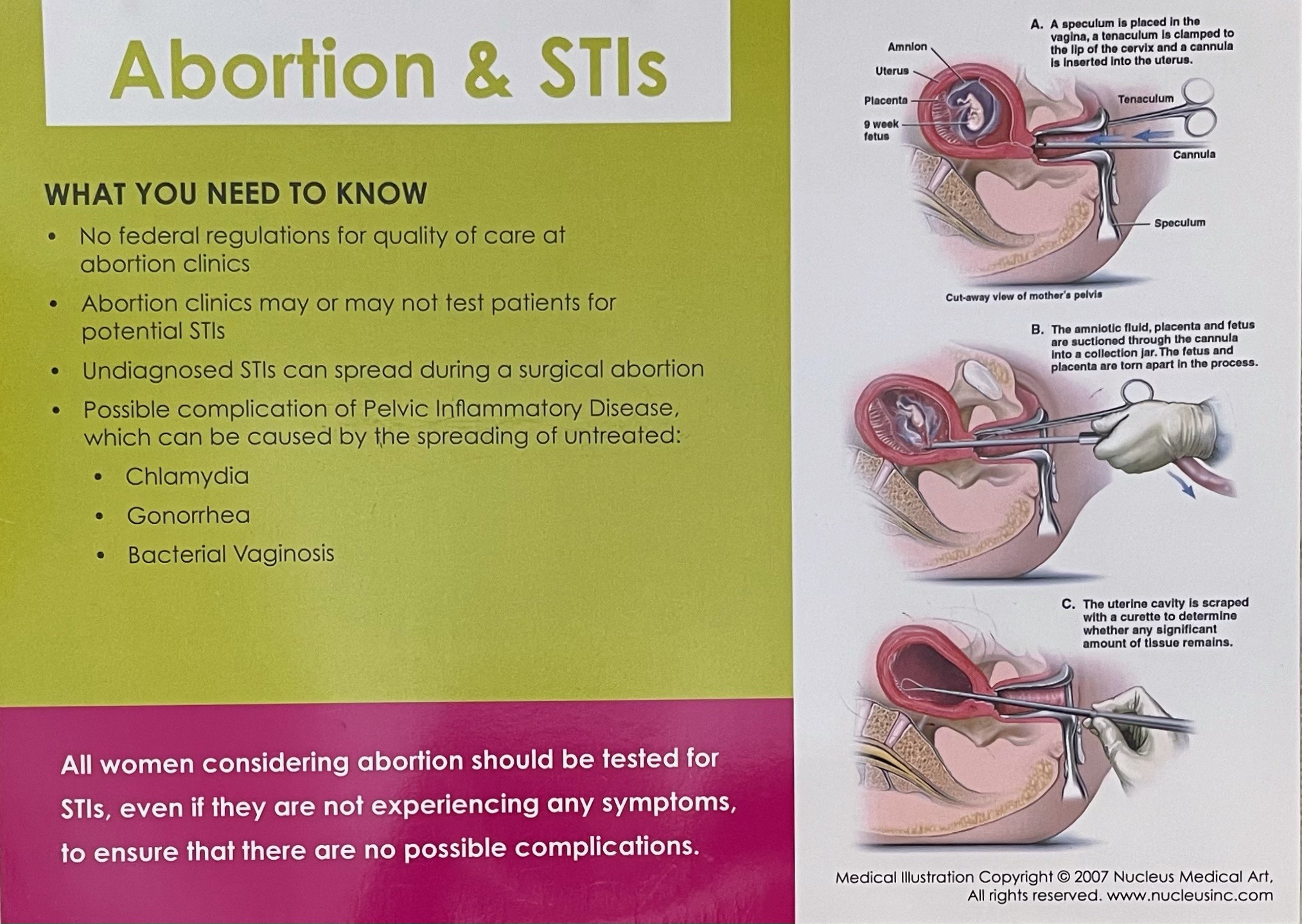Positive Test Packet
Abortion Pill (Time frame varies up to 70 days after LMP) * $635-$800
The abortion pill induces a chemical/medication abortion. It involves 2 medications. The first medication is Mifeprex, which blocks progesterone and interrupts pregnancy development prompting detachment of the implanted embryo. Secondly, Misoprostol is taken up to 48 hours later, inducing contractions to empty the uterus. Expect strong cramping, bleeding, nausea and vomiting. A final visit to the clinic is necessary to ensure the abortion has completed. (8%-10% of women will require a surgical abortion to complete the process.)
Risks & Side Effects:
- Abortion Failure (Incomplete Abortion)
- Bleeding & Hemorrhage
- Infection (RU-486 suppresses the immune system)
- Severe Pain/Cramping
- Nausea/Vomiting/Diarrhea/Fever/Chills/Headache/Dizziness
*Not advised for women who have anemia, bleeding disorders, liver or kidney disease, seizure disorder, acute inflammatory bowel disease, or use an intrauterine device (IUD).
CAUTION: A chemical/medication abortion occurs in private; as such, you may not be expecting to see the results of ending your pregnancy. For example, viewing a discernable head and limbs.
*For information on the abortion pill rescue: Call the rescue hotline (877) 558-0333 or chat online https://www.abortionpillreversal.com
|
Do Not Buy Mifeprex Over the Internet https://www.fda.gov/drugs/postmarket-drug-safety-information-patients-and-providers/mifeprex-mifepristone-information
|
Manual Vacuum Aspiration - (7 weeks after LMP) * $565-$800
The cervix is stretched with dilators wide enough to allow the abortion instruments to pass into the uterus. A hand held syringe is attached to tubing that is inserted into the uterus and the fetus is then suctioned out.
Suction Curettage - most common in-clinic abortion (6 to 16w6d after LMP) * $675-$1100
The cervix is opened with a dilator up to 14 weeks. The doctor inserts tubing connected to a suction machine into the uterus. The suction pulls the fetus's body apart and empties the uterus. Between 14 weeks and 16 weeks 6 days, the cervix will be softened by giving Misoprostol, orally or vaginally, so dilation is easier for the larger fetus.
Dilation & Evacuation -“D&E” (13 to 20w6d after LMP) * $675-$1525
In this procedure, the cervix is softened by giving Misoprostol, orally or vaginally, so cervix can be opened wider than in a first trimester abortion, allowing the doctor to pull out the fetal parts by combination of suction, curette and/or with forceps. The fetus's skull is crushed to ease removal.
Late Term Abortion – “Induction Abortion” (25w after LMP to full term) not available in Ohio
A lethal dose Digoxin is injected into the fetus’s heart or amniotic fluid initiating a fatal heart attack. The cervix is treated for 2-3 days to prepare the deceased fetus for delivery. On the final day, the woman is given Oxytocin to induce labor leading to vaginal delivery.
*Prices are approximate and vary per provider
|
Risks of Abortion: Heavy or continued bleeding, infection, sepsis (infection entering blood), incomplete abortion, allergic reaction to drugs, damage to cervix, scarring of uterus lining, perforation (causing a hole) of the uterus, damage to internal organs, increasing risk of breast cancer, death. Abortion is linked to subsequent preterm births and increased risk for mental health issues. Effect on Future Pregnancies: Scarring or other injury during an abortion may prevent or place at risk future wanted pregnancies. The risk of miscarriage is greater for women post abortion. References: www.americanpregnancy.org, http://abortionpillrisks.org, www.FDA.gov, https://aaplog.org/wp-content/uploads/2013/07/McCaffreys-article.pdf, https://www.abortionprocedures.com/induction/ Revised 01/26/23 Reminder- It is important to know your blood type & STD’s before receiving a chemical or surgical abortion. |
Has anyone ever asked you “What is your blood type?” If you know your blood type, you may answer “O positive” or “A negative” or “B positive”. This is a very important question if you are pregnant, even if you have a miscarriage, an ectopic pregnancy or an elective abortion. Just as there are different major blood groups, such as type A and type B blood, there also is an “Rh factor”. The Rh factor is the type of protein found on the red blood cells. Most people have the Rh factor – they are Rh positive. Others do not have the Rh factor – they are Rh negative. Instead of saying, “I’m A, Rh negative”, we simply say, “I’m A negative”. A simple blood test can tell whether you are Rh positive or Rh negative.
The Rh factor causes problems when an Rh-negative person’s blood comes in contact with Rh-positive blood. During pregnancy, the woman and baby do not share blood systems. However, a small amount of blood from the baby (whether Rh-negative or Rh-positive) can cross the placenta into the woman’s system. These Rh-negative women become sensitized during thier first pregnancy, if the baby is Rh-positive. The mother’s body makes antibodies that attack the blood of the Rh-positive baby in subsequent pregnancies. When this happens, the antibodies break down the baby’s red blood cells, which cause anemia and/or serious illness, brain damage or even death of the baby. The initial pregnancy and each subsequent pregnancy must be treated and in most cases, the condition becomes worse in later pregnancies.
A simple blood test can identify a woman’s blood type and Rh factor. Another blood test, called an antibody screen, can show if an Rh-negative women has developed antibodies to Rh-positive blood.
Whether you plan to have an elective abortion or carry your pregnancy to term, you need to have this simple blood test done because without treatment of the antibodies in your system, if you are Rh negative, any subsequent pregnancies will be adversely affected.
Contact your healthcare provider for more information on the Rh Factor. A referral can be given to you by our staff here at the Eva Women’s Clinic.
Medical Services
Eva Women’s Clinic
Source – ACOG (American College of Obstetrics & Gynecology)









